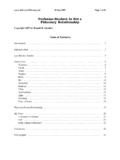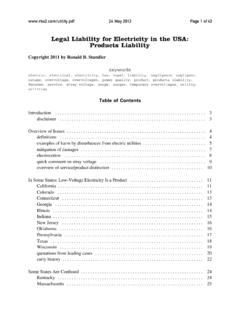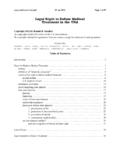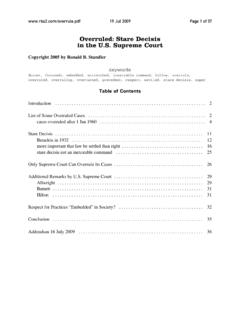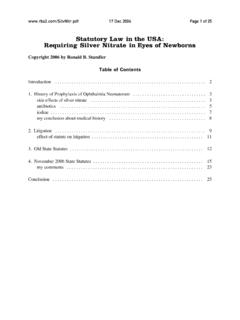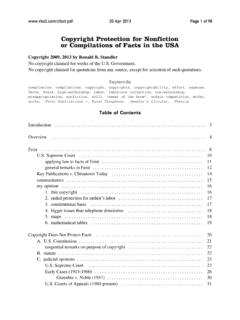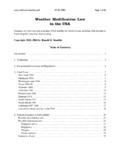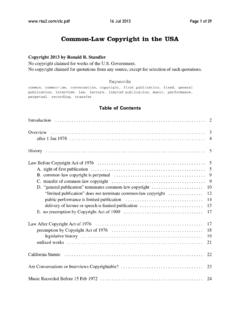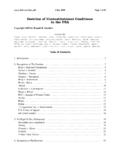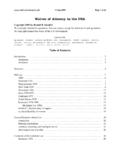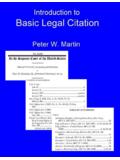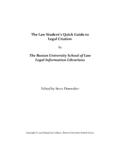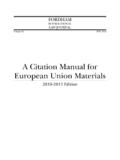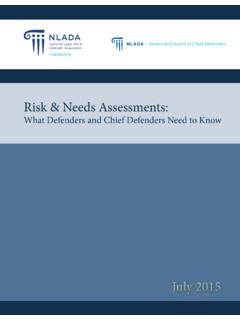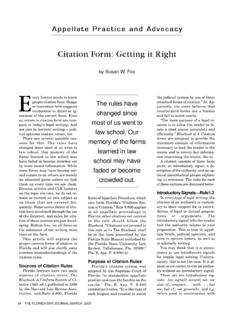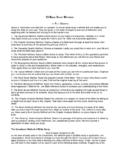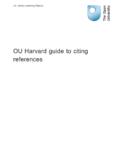Transcription of Why do Legal Research? - rbs2.com
1 17 Mar 2005 Page 1 of 71. Why do Legal research ? Copyright 2003, 2005 by Ronald B. Standler Keywords adverse, argument, arguments, attorney, attorneys, authority, authorities, brief, briefs, case, cases, citation, citations, cite, cited, client, competent, conduct, controlling, counsel, court, courts, duty, ethical, ethics, fail, fails, failed, failure, federal, frivolous, inadequate, judge, judges, law, lawyer, Legal , Lexis, library, litigant, litigants, malpractice, motion, no, none, poor, procedure, professional, research , responsibility, rule, rules, Rule 11, sanction, sanctions, search, Shepardize, skill, state, support, violation, Westlaw.
2 Why Table of Contents 1. Why do Legal research ? .. 3. preliminary draft .. 4. 2. Rules of Practice .. 6. FRCP 11 .. 6. FRAP 28 .. 7. Professional Responsibility .. 8. Rule (a) .. 8. Rule .. 8. 3. Introduction to Cases .. 9. 4. Judicial Comments on Professional Responsibility .. 10. A. federal courts .. 10. Oximetrix .. 10. need to follow citations backwards .. 11. Northwestern National Insurance v. Guthrie .. 12. Jeffrey A. Dickstein, Esq.. 13. Oxfurth v. Siemens .. 14. Massey v. Prince George's County .. 16. Disantis .. 19. Crumpton .. 20. Roeder .. 21. Schoofield v. Barnhart.
3 22. Baldayaque .. 22. B. state courts .. 23. must note dissenting opinion .. 23. preliminary draft 17 Mar 2005 Page 2 of 71. must note plurality opinion .. 24. Johnson v. Parol Board .. 25. Robert L. Johnston, Esq.. 25. Robinson v. Philadelphia .. 26. Carlyle Shepperson, Esq.. 26. Richard J. Thonert, Esq.. 28. Boca Burger .. 28. Tyler v. Alaska .. 30. 5. Sanctions Under Rules of Procedure .. 31. A. federal courts .. 31. Taylor v. Belger Cartage Service .. 31. Smith v. United Transp. Union Local No. 81 .. 33. SEC v. Suter .. 34. Central Ice Cream .. 35. Steven M. Kramer, Esq.. 36.
4 Spangler .. 38. Sheldon v. McGraw-Hill .. 39. Arthur Jackson, Esq.. 40. Hendrix .. 42. Terminix v. Kay .. 44. Karonis v. Commercial Union Ins.. 45. Boyce v. Microsoft Corp.. 45. Samuel A. Malat, Esq.. 46. QDS Components .. 50. B. state courts .. 51. Fowler v. Conforti .. 51. Price v. Cole .. 52. Dace v. Massachusetts .. 53. 6. Judges do no Legal research for litigants .. 53. A. federal courts .. 53. Brooks .. 53. Pelfresne .. 54. Anderson v. Hardman .. 56. B. state courts .. 57. Alabama .. 57. Oklahoma .. 61. Wisconsin .. 61. preliminary draft 17 Mar 2005 Page 3 of 71. 7. Malpractice.
5 62. Smith v. Lewis .. 62. Goebel v. Lauderdale .. 65. Stanley v. Richmond .. 66. Thomas Lazar, Esq.. 66. Shimer v. Foley, Hoag & Eliot .. 67. Cooks v.. 68. 8. Why do some attorneys do poor research ? .. 69. 1. Why do Legal research ? The function of a brief is to briefly recite the facts of the case, explain the applicable law, apply the law to the facts of the case, and explain why the attorney's client should prevail on this motion or win at trial. Citations to statutes and cases makes the attorney's explanation of the law credible, by allowing the judge to easily check what the attorney alleges is the correct law.
6 As mentioned later in this essay, beginning on page 53, judges will not do Legal research for litigants. An attorney should inform the judge of the controlling law in the jurisdiction. In routine cases with familiar issues, the judge probably already knows the law well, but citations to authorities are still expected. However, in cases involving unfamiliar issues or obscure law, the judge will need the attorneys to explain the applicable law, so citations to statutes and cases are essential. If there is no case on point in the jurisdiction, one will need to either (1) find a case on point in a foreign jurisdiction, (2) find cases on analogous issues and make a novel argument, or (3) argue from basic principles, such as the federal and state constitutions, maxims of equity, and rules in the Restatements of the Law.
7 Some judges are willing to make new law in their jurisdiction by following some persuasive authority that is cited to them in a Brief. Attorneys who understand the law can cite facts that distinguish their case from what might casually appear to be a simple application of precedent from the leading case. There is another important reason to do Legal research : to find all viable Legal theories to include in the Complaint, and to avoid Legal theories that have failed in the past for good reasons that are explained in prior cases. Personally reading cases is part of the preparation of an attorney for oral arguments in appellate court, where the attorney must be intimately familiar with the relevant cases and instantly able to respond to complicated questions from a judge.
8 Preliminary draft 17 Mar 2005 Page 4 of 71. overview of this essay Beginning at page 6, this essay briefly reviews the relevant rules of civil and appellate procedure and the relevant rules of professional responsibility, then quotes from many cases that show how judges apply these rules. Beginning at page 53, this essay explains that judges have neither the time nor the inclination to do Legal research for litigants. At pages 62 to 69, this essay discusses Legal malpractice for failure to do Legal research . Within each section, I arrange the cases in chronological order, with the oldest first, so the reader can follow the historical evolution of the common law.
9 Finally, beginning at page 69, I have some provocative comments on why some attorneys do poor Legal research . When lack of Legal research by an attorney is mentioned in a judicial opinion, the mention is usually one or two paragraphs that are buried in a long opinion on other matters. Understanding these isolated one or two paragraphs is complicated by details from the case that make sense only if one reads the entire opinion. This essay is intended only to present general information about an interesting topic in law and is not Legal advice for your specific problem. See my disclaimer at.
10 Why this essay is a preliminary draft I began this essay in October 2003, with the intent to quote judicial opinions that criticized attorneys for inadequate Legal research and to show the importance of doing good Legal research . After working on this essay for 33 hours, my interest and my enthusiasm waned, because there were so few published judicial opinions in which attorneys were significantly sanctioned for inadequate Legal Consequently, this document is mostly a collection of quotations and citations, with little commentary and explanations that are necessary for a coherent essay.
